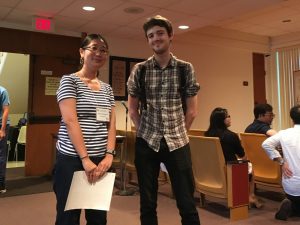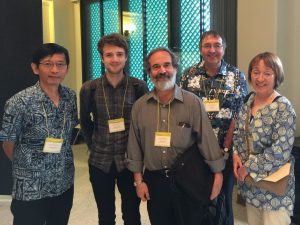DILLON COLLOQUIUM
This Friday, November 17th, at 4:00 pm in Humanities 1, Room 210, there will be a colloquium talk by Brian Dillon (UMass, Amherst). His talk is entitled “Process and representation in morphosyntactic processing: A psychophysical approach using Signal Detection Theory.” The abstract is given below:
Intuitive acceptability judgments have long formed the empirical foundation of syntactic and (to a lesser extent) psycholinguistic theories (Schütze, 1996). Despite their centrality, there remain many open issues in the collection, analysis, and interpretation of acceptability judgment data. One important thread of research in experimental syntax addresses these issues by borrowing methodology from psychophysics, such as magnitude estimation (Bard et al. 1996; Cowart, 1997), to more precisely model the relationship between linguistic stimuli and perceived acceptability.
In this talk I will follow these researchers in treating intuitions of acceptability as psychological evidence. Accordingly, I will argue that acceptability judgments can be fruitfully understood as psychophysical data. To this end, I will describe a framework for analyzing acceptability judgment data using Signal Detection Theory (Bader & Haussler, 2010; Macmillan & Creelman, 2005). This approach offers an explicit model of how the underlying percept of acceptability is reflected in experimental measures of acceptability, such as judgments in a rating task.
To illustrate this approach, I survey a series of studies that investigate diverse illusory agreement licensing phenomena (“agreement attraction”) in English using untimed acceptability judgment measures (joint work with Charles Clifton, Christopher Hammerly, Joshua Levy, and Adrian Staub). I report several results. First, untimed judgment measure mirror the patterns seen in more ‘online’ measures of sentence comprehension. Second, the untimed judgment data exhibit surprisingly little evidence of contamination from slow, ‘deliberative’ processes (cf. Bader & Haussler, 2010). Third, and perhaps most interestingly, this analysis of the judgment data yields unique insights into the cognitive processes and representations that underly agreement attraction effects. In particular, the judgment data lend support to models that analyze illusory agreement errors as the result of mis-identification of an agreement controller in working memory (e.g. Badecker & Kuminiak, 2007; Wagers et al., 2009), rather than models that locate the error in a noisy representation of the morphosyntactic features of the agreement controller (e.g. Eberhard, Cutting & Bock, 2005).

